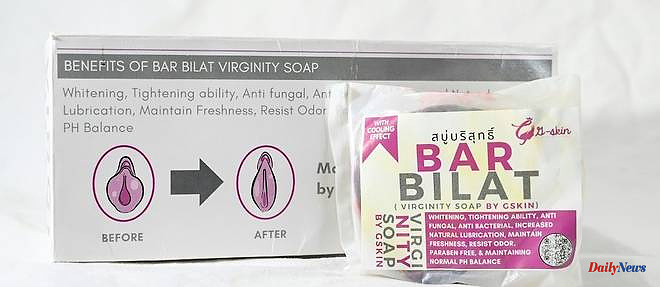Bread of "virginity soap" in hand, Filipino YouTuber Rosanel Demasudlay assures her hundreds of subscribers in front of the camera that this product is safe and can help them "tighten" their vagina.
His video is among the countless pseudo-medical and dangerous content that swarms social media, with Filipinos among the biggest users in the world.
Even before Covid and the lockdown, many residents fearful of seeing a doctor sought treatment online, where prices are cheaper and drugs easier to access.
During the pandemic, AFP fact-checkers have noted an explosion of misinformation around untested cosmetics and miracle cures for chronic pathologies.
The majority of this content appears on Facebook in traditional publications or is promoted by paid advertisements.
They can then circulate for weeks or even months without being flagged by Facebook, which faces a torrent of misinformation.
The social network has a largely automated system for checking advertisements before they go live, but there is no preflighting of simple posts.
Most of the products are offered in doctored videos to look like professional content endorsed by real doctors.
Others appear in manipulated press clippings, or are touted by videographers like Rosanel Demasudlay.
AFP fact-checkers verified dozens of them, including a fake Filipino report that appeared to portray a herbal dietary supplement as an alternative to insulin for diabetics.
A single post of this fake video was viewed more than three million times, shared more than 7,000 times, and garnered nearly 10,000 comments, including many authors saying they wanted to buy the product.
The 15-minute video by Rosanel Demasudlay has been viewed more than 10,000 times since its publication in August 2022.
She falsely claims that "Bar Bilat Virginity Soap" has been approved by the Philippine Food and Drug Administration (FDA) as a treatment for skin conditions that also helps tighten the vagina -- translated "bilat" in a dialect local.
But the FDA has actually warned consumers against using this "unapproved" soap because of possible risks ranging from irritation to organ failure.
Months later, the YouTuber, who refused an interview with AFP, admitted in another video that the soap had caused her "itching to the point of bleeding". Yet she continued to promote it.
During the pandemic, alarmed Filipino doctors began posting their own free videos answering common health questions.
But the initiative backfired when fake treatment advocates misused extracts to promote their products.
Manila-based rheumatologist Geraldine Zamora is among the doctors targeted.
In 2020, she started posting videos on TikTok, where she has over 60,000 subscribers and hundreds of thousands of views.
"It was a good thing for us because we were able to spread our medical knowledge to people who otherwise wouldn't have been able to see a doctor," she explained.
However, its contents have been used to promote an unregistered brand of arthritis-relieving supplements that the FDA has warned against.
Before being taken down by Facebook, the doctored videos were viewed tens of thousands of times, including by Ms Zamora's patients, who considered buying the product because she appeared to recommend it.
The WHO told AFP that "this inappropriate promotion and advertising" for unregistered medicines is an old global problem, reinforced by the pandemic.
Filipinos are particularly vulnerable to medical misinformation due to a shortage of doctors and heavy internet usage, said Eleanor Castillo, a public health expert at the University of the Philippines.
And "especially in remote areas", doctors only come a few times a month, she adds.
The use of unapproved treatments can have serious consequences.
The president of the Philippine Academy of Ophthalmology, Vicente Ocampo, has reported that patients, sometimes teenagers, have gone blind after using eye drops purchased online.
“It saddens us that people believe without hesitation in advertisements which claim to be able to cure all eye problems as quickly as possible, and that they are ready to pay an exorbitant price for these drops”, he lamented.
According to him, Facebook posts selling the drops from an unregistered brand used images of real doctors and the name of the Academy.
Mr. Ocampo notified consumers on Facebook in September 2022 and received only 57 interactions -- likes, shares, comments.
The same month, four misleading publications on the product, studied by AFP, generated nearly 34,000.
The advertising policy of Meta, the parent company of Facebook, prohibits "promises or suggestions of unrealistic results" in terms of "health, weight loss or economic opportunity".
Keyword searches on Facebook, however, showed hundreds of AFP-verified adverts still online.
Meta told AFP that he was working with the Philippine authorities to "address" the problem of illegal canvassing.
03/16/2023 08:42:36 - Manila (AFP) - © 2023 AFP












